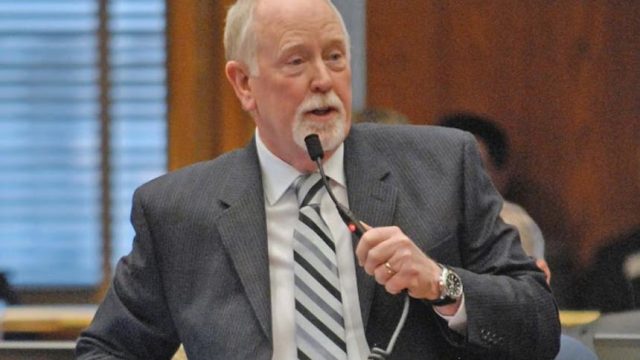Mark Johnson: Claims From Democrats to the Contrary, Al Carlson Doesn’t Command North Dakota’s State House

TOM STROMME.TribuneHouse majority leader Rep. Al Carlson (R-Fargo) urged a no vote on SB 2279 saying "do we condone discrimination if we vote no on this bill? Absolutely not."
As a Political Scientist who has extensively studied the North Dakota Legislature, I have to take exception to a claim that I see frequently in campaign literature, letters to the editor, and even blog comments and posts. Despite popular opinion, the evidence clearly does not support the notion that Majority Leader Al Carlson (Fargo) “commands” or “controls” the votes in the State House of Representatives.
In 2015, for example, as detailed by my research on the subject (available for free at www.ndpoliprof.com), on all 464 votes in which there was some dispute or disagreement, Carlson was on the winning side only 85% of the time. Contrast that with Minnesota, where, on average, the Speaker of the House (the party leader in that body) prevails over 99% of the time.
As political scientists Boris Shor and Nolan McCarty have detailed in their comparative study on the subject, North Dakota’s Legislature is, in fact, one of the least partisan and polarized in the nation.
When looking of the voting records of legislators currently running for re-election in the area, we see further evidence of the fact that local legislators often vote their conscience or the needs of their districts. Rep. Blair Thoreson (R-Fargo) voted in agreement with Carlson only 76.7% of the time.
Rep. Jim Kasper (R-Fargo) agreed with Carlson 77.3% of the time, and Rep. Ben Koppelman (R-West Fargo) voted with Carlson on only 72.8% of those votes.
Even Democrats Josh Boschee (Fargo) and Ben Hanson (West Fargo) voted in agreement with Carlson 39.2% and 37.6% of the time, respectively (and these numbers don’t include votes where there was unanimous or near-unanimous agreement).
Having observed and studied State Legislatures for over 15 years, I can say with absolute certainty that North Dakota legislators are much more open and receptive to the needs of their constituents, and aren’t easily controlled by party caucus leaders. To suggest otherwise clearly defies the actual evidence.




